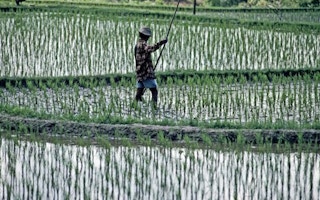In 2010, SustainAbility was retained by Standard Chartered Bank to assist in quantifying and qualifying the impact (social, environmental and economic) of its operations in Ghana and Indonesia. This was in line with providing substance to the bank’s new promise, Here for Good. The logic (or business case) is simple – contribute to building a more resilient and healthy economy, and have more and wealthier clients. The resulting reports are available on the Bank’s website.
While a team of academics pored over official statistics and Bank numbers, we facilitated stakeholder engagement sessions and interviews to validate and illustrate econometric evidence, and to provide insights on priorities and future trends. One of our important findings was around agriculture, a key sector of the economy because it occupies the bulk of the population. Our study showed that despite its importance to national development and food security, agriculture is financially underserved and not currently prioritized by policy-makers and corporations alike. As a result, poor productivity is endemic and unsustainable practices frequent. But our study also showed that there are significant and attractive opportunities to invest in agriculture in these countries that make business sense and can transform economies.
As a country, Ghana has everything it needs to be food secure. Despite a third of the GDP coming from this sector, the country is a net importer of food, including basic commodities like rice and tomatoes. Our study showed that the lack of investments in the sector is largely due to the fragmented and small land holdings, and title-related issues are the principle cause of this. But as has been shown in the case of the Ghana Cocoa Board, which brings together about 800,000 farmers (Standard Chartered is one of its major lenders and mandated lead arrangers), aggregation not only serves growers but also provides business opportunities to those associated with the sector – buyers, processors, transporters, etc.
Indonesia, the other country covered in this study, has its own set of complexities. The country’s GDP is relatively less dependent on agriculture (about 15%) but the sector still employs over 40% of the workforce and the country is a significant importer of food. Indonesia is also one of the largest producers and exporters of plantation-based commodities like palm oil, rubber, timber and cocoa. Like in the case of Ghana, the Standard Chartered Bank study showed that investment in agriculture can provide significant business benefits. However, great challenges remain, especially in the plantations sector, where forests have given way to plantations and unsustainable practices have adversely impacted the agriculture potential of the land. The good news is that multinational companies like Unilever (the largest buyer of palm oil) have begun to insist on better compliance with standards such as those from the Forest Stewardship Council and the Roundtable on Sustainable Palm Oil.
So, what lessons emerge for corporations looking to invest in the South? For one, there seem to be significant win-win opportunities to invest in sustainable agriculture practices. Governments are keen and once the ground conditions are good, it can be profitable for banks to increase their lending to this sector, as the Standard Chartered Bank study indicated. Agriculture trading companies like Olam (mentioned in our workshops) have recognised that investing in emerging markets early gives a huge business advantage.
Second, as governments realise that it is in their interest to invest in improving conditions for agriculture, as that is where the bulk of their poor are engaged, this is a good opportunity for companies to be seen by governments are reliable partners.
And third, for responsible food processing and retailing companies (and the banks financing them), securing supply chains means investing in organising and aggregating agriculture supply chains, and incorporating sustainability practices. This will increase the durability and resilience of their sourcing and might generate competitive advantage.
Investing in ‘traditional’ sectors alongside newly developed Oil & Gas sectors in both these countries is crucial to ensure a more fair and resilient economy. Ghana and Indonesia are but two exciting countries with stable political systems where the value in agriculture is just waiting to be unlocked in a manner that benefits business and society. There are many more. Are businesses ready?
Co-authors Shankar Venkateswaran and Jean-Philippe Renaut are Director and Manager respectively at SustainAbility. SustainAbility is a think tank and strategy consultancy working to inspire transformative business leadership on the sustainability agenda.


















